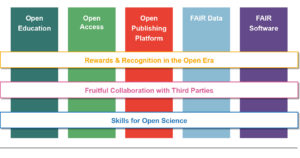As a tradition I am wrapping up the year in this weblog. And what an opportunity! The same day as a very interesting opinion article is published in one of the national newspapers, i.e, “Digitization is threatening our university. It’s time to draw a line” (Dutch only).
The rectores magnifici of the Dutch universities think it is time to draw a line, warning about the increasing dependence on (American) tech companies. They give examples from educational software providers (such as Turnitin, or EdX), but also from more research-oriented providers (ResearchGate, SciVal, and Academia.edu). And although we apparently need those vendors, there are also risks in becoming too dependent on them.
The rectores are concerned that the revenue model of these companies is primarily based on collecting user data (with which they can offer personalized advertisements and services). And that we loose our control of these (our) data.
What I am personally very pleased about is that the 17 signatories plead for a “counter power and a joint policy”. Because that is exactly what we started (with my VSNU-hat on) almost a year ago, to develop common conditions that we (preferably internationally) take along with us in our negotiations with commerial providers, whether they service educational software or are supporting the research cycle.
So as is stated in the article “the sector must learn from other public sectors. Higher education is not unique. In primary education, the platformisation of learning environments is developing very rapidly and commercial providers (Google, Microsoft) are increasingly present. Healthcare has relevant parallel developments and Dutch municipalities are also busy with a safe and responsible transformation to a digital organization.”
Just in time to do this, with the first phase of a new Elsevier framework agreement installed, it is now to set out standards firmly. We can take the examples from cOALition S (or the addendum for transformative journals), JISC, ESAC and complete it with the above-mentioned table. Always bear in mind that there are more parameters – think about content, governance and infrastructure, all elements are important to take into account. We need to team up here, nationally (as the rectores show) and internationally.
Something positive to end 2019 with. When I read the strategic agenda for our higher education and research (Dutch only) I also see motivating signals – apart from the focus on student- (instead of study-) success and the possibility to ease the switch between HBO (university of applied sciences) and WO (universities) students, the Minister of Education and Culture and Science asks for more cooperation and less (unnecessary) competition. There is a concern for the (too high) workload and for a lack of recognition of all the good work: From 2020, the minister will award “two prestigious education prizes for HBO and WO to teams of teachers who have realized successful educational innovation projects”. This “education premium” becomes the equivalent of the Spinoza and Stevin premiums for the universities and the Delta premium (applied research) for colleges. And it goes to teams of teachers.
Great! Makes it an excellent opportunity to refer to two important documents: first the position paper by VSNU, NFU, KNAW, NWO and ZonMw about recognition and rewarding. For me the most difficult part to tackle in the open science transition. We can only make real progress in open access when we are less focused on (the number of) publications, and in making our research data or software FAIR, if all the work that is needed for it, is being recognized and rewarded. In that way I think it is a pity that we have taken out that pillar from the NPOS (now called national programme open science, formerly known as platform, and still building on the national plan). But, being positive, it is on the agenda, NWO recently announced that she is going to assess CVs “much more on their quality and (sustainable) impact than on their quantity and prestige”. The VSNU is bringing together all open science officers of her universities, and our own TU Delft has just endorsed her open science programme “research and education in the open era”. I am especially proud that we have included open education there (thank you Irene Haslinger, Nicole Will, Willem van Valkenburg, Anke Versteeg, and many many others!). As a university we want to be transparent in all our processes, education, research and valorisation.
I like these holistic approaches – perhaps we even should consider a better rewarding and assessment system for supporting staff as well, now that we speak of it.

So it all adds up to a positive ending for 2019, with just one final observing remark, and that is about excellence. Where we strive for excellence, we risk as counteract an increased working pressure and unnecessary competition. We cannot all stand out, we need each other, and team up. And where possible share our findings in an early stage, so that society benefits. In that we should excel. It is not about us or about our impact. It is about them and doing relevant research that matters, and educating engineers who can make a difference. Yes, to make the world a better place.

1 comment on "Team up. It is essential."